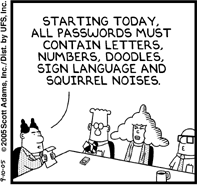| Dilbert | |
|---|---|
 "Announcement of changes in company password policy". From left: the Pointy-haired Boss, Dilbert, Alice, and Wally (Pub. September 10, 2005) | |
| Author | Scott Adams |
| Website | scottadams |
| Current status/schedule | Running |
| Launch date | April 16, 1989 |
| End date | March 26, 2023 (syndicated run; continued as a webcomic) [1] |
| Alternate name | Dilbert Reborn (2023–) |
| Syndicate(s) | United Feature Syndicate (United Media, 1989–June 2011) (Universal Uclick/Andrews McMeel Syndication, June 2011–March 2023) |
| Publisher(s) | Andrews McMeel Publishing (until March 2023) Self-distributed through Locals (since March 2023) |
| Genre(s) | Satire, observational comedy, surreal comedy |
Dilbert is an American comic strip which was written and illustrated by Scott Adams, first published on April 16, 1989. [2] It is known for its satirical office humor about a white-collar, micromanaged office with engineer Dilbert as the title character. It has led to dozens of books, an animated television series, a video game, and hundreds of themed merchandise items. Dilbert Future and The Joy of Work are among the best-selling books in the series. In 1997, Adams received the National Cartoonists Society Reuben Award and the Newspaper Comic Strip Award for his work. Dilbert appears online and as of 2013 was published daily in 2,000 newspapers in 65 countries and 25 languages. [3]
Contents
- Publication history
- Themes
- Characters
- Dilbert
- Pointy-Haired Boss (PHB)
- Wally
- Alice
- Dogbert
- Catbert
- Asok
- The CEO
- Ted
- Tina
- Carol
- Dave
- The Elbonians
- Phil
- Ratbert
- Legacy
- Criticism and parody
- Language
- Management
- Webcomics
- Awards
- Media
- Comic strip compilations
- Business books
- Other books
- Merchandise
- Unaired pilot
- Animated series
- Animated web shorts
- Cancelled film adaptation
- Video games
- "Drunken lemurs" case
- Guest artists
- See also
- Notes
- References
- External links
In 2023, Dilbert was dropped by numerous independent newspapers as well as its distributor, Andrews McMeel Syndication (which owns GoComics, from where the comic was also removed), after Adams published a video where he called Black Americans who disagreed with the slogan "It's okay to be white" a "hate group" and said White Americans should "get the hell away from" them. [4] [5] The video was widely described by sources such as The Economist and Reuters as containing "racist comments" and being a "racist rant". [4] [5] Adams stated that he disavows racism. [6] The following month, Adams relaunched the strip as a webcomic on Locals under the new name Dilbert Reborn. Adams died in January 2026.